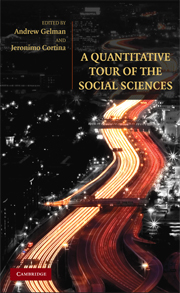Book contents
- Frontmatter
- Contents
- Preface: Learning to Think Like a Social Scientist
- About the Contributors
- PART I MODELS AND METHODS IN THE SOCIAL SCIENCES
- PART II HISTORY
- PART III ECONOMICS
- PART IV SOCIOLOGY
- PART V POLITICAL SCIENCE
- 15 What Is Political Science?
- 16 The Politics of Supreme Court Nominations: The Critical Role of the Media Environment
- 17 Modeling Strategy in Congressional Hearings
- PART VI PSYCHOLOGY
- PART VII TO TREAT OR NOT TO TREAT: CAUSAL INFERENCE IN THE SOCIAL SCIENCES
- References
- Index
15 - What Is Political Science?
Published online by Cambridge University Press: 05 June 2012
- Frontmatter
- Contents
- Preface: Learning to Think Like a Social Scientist
- About the Contributors
- PART I MODELS AND METHODS IN THE SOCIAL SCIENCES
- PART II HISTORY
- PART III ECONOMICS
- PART IV SOCIOLOGY
- PART V POLITICAL SCIENCE
- 15 What Is Political Science?
- 16 The Politics of Supreme Court Nominations: The Critical Role of the Media Environment
- 17 Modeling Strategy in Congressional Hearings
- PART VI PSYCHOLOGY
- PART VII TO TREAT OR NOT TO TREAT: CAUSAL INFERENCE IN THE SOCIAL SCIENCES
- References
- Index
Summary
Politics is part of virtually any social interaction involving cooperation or conflict, thus including interactions within private organizations (“office politics”) along with larger political conflicts. Given the potentially huge domain of politics, it's perfectly possible to talk about “the politics of X,” where X can be anything ranging from table manners to animal “societies.” But although all of these are studied by political scientists to some extent, in the American academy “political science” generally means the study of a rather circumscribed range of social phenomena falling within four distinct and professionalized fields: American politics, comparative politics, international relations, and political theory (that is, political philosophy).
AMERICAN POLITICS
Broadly speaking, the academic field of American politics is exactly what one would expect: public opinion, voting, elections, legislatures, courts, and so on.
What's new and interesting here? Well, something very peculiar and quite disturbing has happened in American politics (the real thing). Every day in the halls of Congress and every night on political talk shows, partisans from the right and left fight a culture war with the intensity and viciousness of scorpions locked in a bottle. But for the most part, the public doesn't notice, isn't listening, and doesn't care. In short, political elites have polarized ideologically but, on average, ordinary citizens have not. Perhaps the most interesting recent work in American politics (the field) documents this strange development, explores why it has occurred, and investigates its consequences.
- Type
- Chapter
- Information
- A Quantitative Tour of the Social Sciences , pp. 207 - 222Publisher: Cambridge University PressPrint publication year: 2009



